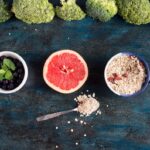Aging is a natural process, but the rate and way we age can be significantly influenced by our dietary choices. This comprehensive analysis explores how plant-based foods can support healthy aging through multiple perspectives – nutritional biochemistry, skin health science, cellular longevity research, functional medicine, and practical culinary applications. By weaving together diverse fields of knowledge, we reveal how specific plant compounds work synergistically to combat oxidative stress, reduce inflammation, support collagen production, and protect against age-related cellular damage. From antioxidant-rich berries and leafy greens to omega-3-packed seeds and sulfur-containing vegetables, the plant kingdom offers remarkable tools for extending both lifespan and “healthspan.” Understanding and applying this knowledge creates a sustainable approach to aging gracefully from the inside out, supporting a vibrant, energetic life through evidence-based, delicious plant-based nutrition. Natural vegan skincare tips to nourish and protect skin
LENS 1: Nutritional Biochemistry
The Molecular Foundation of Aging: How Plant Compounds Work at the Cellular Level
Aging begins at the cellular level, where complex biochemical processes determine how quickly our cells deteriorate or maintain their youthful function. Plant foods contain thousands of bioactive compounds that interact with these processes in ways that can significantly influence the aging trajectory.
Polyphenols: The Plant World’s Anti-Aging Powerhouses
“Polyphenols are arguably the most potent anti-aging compounds found in the plant kingdom,” explains Dr. David Sinclair, Professor of Genetics at Harvard Medical School. “These compounds, which give fruits and vegetables their vibrant colors, have been shown to activate sirtuins—proteins that regulate cellular health and longevity.”
Recent research has revealed that polyphenols help combat aging through multiple mechanisms:
- Activating longevity genes that protect cells from stress
- Reducing oxidative damage to cellular components
- Modulating inflammation pathways that accelerate aging
- Supporting mitochondrial function and energy production
- Enhancing cellular repair mechanisms
A 2025 review published in Immunity & Ageing found that plant-based phytochemicals can improve skin elasticity, reduce hyperpigmentation, prevent the breakdown of important skin proteins, and support wound healing, making them valuable components for skin care and anti-aging treatments.
Nutritional Deep Dive: Key Anti-Aging Plant Compounds
| Compound Class | Top Vegan Sources | Anti-Aging Mechanisms | Research Evidence |
| Anthocyanins | Berries, purple grapes, red cabbage | Activate antioxidant enzymes, reduce inflammation | Reduced oxidative damage markers in clinical studies |
| Flavanols | Cacao, green tea, apples | Improve blood flow, protect skin from UV damage | Enhanced skin elasticity and hydration in human trials |
| Resveratrol | Grapes, blueberries, peanuts | Activates sirtuin proteins, mimics caloric restriction | Extended lifespan in laboratory models |
| Quercetin | Red onions, kale, cherries | Senolytic properties (removes damaged cells) | Reduced markers of cellular senescence |
| Curcumin | Turmeric, curry powder | Anti-inflammatory, activates Nrf2 pathway | Improved inflammatory biomarkers in aging adults |
Oxidative Stress: The Free Radical Theory of Aging
“Oxidative stress results from an imbalance between free radical production and the body’s ability to neutralize these reactive molecules,” notes Dr. Rhonda Patrick, biochemist and aging researcher. “Plant foods provide an arsenal of antioxidants that help restore this balance and protect cells from oxidative damage.”
Research consistently shows that diets rich in plant antioxidants are associated with:
- Reduced biomarkers of oxidative stress
- Protection of DNA from damage and mutations
- Preservation of telomere length, a key marker of cellular aging
- Lower incidence of age-related diseases
- Improved markers of skin aging and photoprotection
A 2021 review in Antioxidants highlighted that “the beneficial effects of plant-based foods are mainly due to the large amount of bioactive phenolic compounds contained” which support various health-promoting effects, especially in the elderly population.
Voice of Experience: The Biochemist’s Perspective
“What’s most fascinating about plant compounds and aging is that they don’t just treat the symptoms of aging they address the fundamental mechanisms,” shares Dr. Valter Longo, Director of the Longevity Institute at USC. “Take the polyphenols in berries, for example. These compounds don’t just provide antioxidant activity; they actually communicate with our genes, turning on pathways that help cells resist stress and function more youthfully. It’s like they’re speaking our cells’ language, telling them to stay young. And unlike isolated supplements, these compounds work synergistically in whole plant foods, creating effects greater than the sum of their parts. The research increasingly shows that it’s this symphony of plant compounds, rather than any single ‘miracle’ nutrient, that provides the most profound anti-aging benefits.”
LENS 2: Skin Health Science
Beauty From Within: Plant Foods for Radiant Skin
Skin aging involves both intrinsic (chronological) and extrinsic (environmental) factors, with diet playing a crucial role in how skin responds to both. Plant-based foods offer specific nutrients and compounds that support the skin’s structure, moisture barrier, and ability to protect itself from damage.
Collagen Support: Plant-Powered Pathways to Firm Skin
While collagen itself is not found in plants, many plant foods support the body’s natural collagen production and preservation. “Collagen is the protein that gives skin its structure, suppleness, and stretch,” explains dermatologist Dr. Whitney Bowe. “As we age, we produce less collagen in our skin every year—hence the tendency toward wrinkles and thinning skin.”
Plant foods support collagen through several mechanisms:
- Vitamin C: Essential for collagen synthesis and cross-linking
- Antioxidants: Protect existing collagen from degradation
- Silica: Provides building blocks for collagen matrix
- Plant flavonoids: Inhibit enzymes that break down collagen
- Zinc and copper: Act as cofactors for collagen production
Red bell peppers exemplify this collagen-supporting power, as they contain powerful antioxidants called carotenoids along with abundant vitamin C which is good for collagen production. This combination makes them one of the most effective Vegan plant foods for skin health.
Skin Health Deep Dive: Plant Foods for Specific Skin Concerns
| Skin Concern | Beneficial Plant Foods | Key Compounds | Visible Benefits |
| Wrinkles & Elasticity | Berries, citrus fruits, red bell peppers | Vitamin C, anthocyanins, carotenoids | Improved firmness, reduced fine lines |
| Hydration & Barrier Function | Avocados, walnuts, chia seeds | Omega fatty acids, vitamin E, phytosterols | Enhanced moisture retention, smoother texture |
| Hyperpigmentation | Pomegranates, tomatoes, dark leafy greens | Ellagic acid, lycopene, glutathione precursors | More even tone, reduced age spots |
| Inflammatory Skin Conditions | Turmeric, ginger, berries | Curcumin, gingerols, polyphenols | Reduced redness, improved clarity |
| UV Damage Protection | Green tea, dark chocolate, tomatoes | Catechins, flavanols, lycopene | Increased resilience to sun exposure |
Beyond Collagen: The Plant-Based Solution to Comprehensive Skin Health
“Healthy skin requires more than just collagen,” notes Dr. Rajani Katta, dermatologist and author. “Cellular turnover, inflammation management, and protection from UV radiation all play vital roles in maintaining a youthful appearance.”
Plant foods address these facets of skin aging through:
- Phytoceramides in sweet potatoes, wheat, and spinach that support skin barrier function
- Carotenoids in brightly colored fruits and vegetables that provide internal photoprotection
- Polyphenols in green tea, dark chocolate, and berries that reduce inflammatory skin damage
- Plant-based omega-3 fatty acids that support skin membrane integrity and moisture balance
- Sulfur compounds in cruciferous vegetables and alliums that aid detoxification and cell turnover
Research from a 2025 study published in Nature Communications found that populations with higher plant protein consumption had better skin aging outcomes, reinforcing the connection between plant-rich diets and skin health.
Voice of Experience: The Dermatologist’s Perspective
“After two decades of treating skin conditions, I’ve observed that my patients with the most youthful skin share one common trait: they consistently consume abundant plant foods,” shares Dr. Neelam Vashi, Associate Professor of Dermatology at Boston University School of Medicine. “While topical products certainly help, they can only address the outermost layers of skin. Diet, however, nourishes skin from within, supporting all layers from the hypodermis to the epidermis. I’ve seen remarkable transformations in patients who shift to plant-rich diets—not just smoother texture and fewer wrinkles, but a vibrant quality that no cream can replicate. The research confirms what I observe clinically: phytonutrients in colorful fruits and vegetables protect against photoaging, support natural moisturizing factors, and maintain the skin’s structural integrity. When patients ask about anti-aging, I always say that what they put on their plates is just as important as what they put on their faces.”
LENS 3: Cellular Longevity Research
From Cell to System: How Plant Foods Influence Aging Pathways
Beyond skin appearance, aging affects every tissue and organ in the body. Emerging research in cellular longevity has identified key pathways involved in the aging process that can be influenced by plant compounds.
The Hallmarks of Aging: Plant Compounds as Modulators
“Research has identified several hallmarks of aging that represent the cellular and molecular changes that contribute to functional decline,” explains Dr. Rafael de Cabo, Chief of the Translational Gerontology Branch at the National Institute on Aging. “Remarkably, many plant compounds have been shown to target multiple hallmarks simultaneously.”
Key aging hallmarks influenced by plant foods include:
- Genomic instability: Protected by antioxidants in berries and cruciferous vegetables
- Telomere attrition: Slowed by polyphenols in fruits, vegetables, and green tea
- Epigenetic alterations: Modified by compounds in turmeric, green tea, and cruciferous vegetables
- Loss of proteostasis: Improved by flavonoids in berries and citrus fruits
- Deregulated nutrient sensing: Modulated by resveratrol and other polyphenols
- Mitochondrial dysfunction: Protected by plant antioxidants and coenzyme Q10 precursors
- Cellular senescence: Reduced by quercetin in onions, apples, and berries
- Stem cell exhaustion: Supported by nutrients in green vegetables and berries
- Altered intercellular communication: Improved by anti-inflammatory plant compounds
Cellular Longevity Deep Dive: Plant Foods and Aging Mechanisms
| Longevity Pathway | Top Plant Foods | Active Compounds | Research Findings |
| Autophagy | Green tea, turmeric, berries | EGCG, curcumin, spermidine | Enhanced cellular cleanup and recycling |
| AMPK Activation | Berries, bitter melon, cruciferous vegetables | Anthocyanins, polyphenols | Improved energy metabolism, reduced fat accumulation |
| Sirtuin Activation | Grapes, cacao, green tea | Resveratrol, epicatechin | Mimics benefits of caloric restriction |
| mTOR Inhibition | Leafy greens, cruciferous vegetables | Flavonoids, glucosinolates | Regulated cell growth and metabolism |
| NF-κB Regulation | Turmeric, ginger, berries | Curcumin, gingerols, quercetin | Reduced systemic inflammation |
The Vegan Advantage: Plant Protein for Longevity
A groundbreaking 2025 study published in Nature Communications demonstrated that countries which consume more plant-based proteins have longer adult life expectancies. The researchers analyzed food supply and demographic data from 101 countries, concluding that plant protein intake correlates with increased longevity even after controlling for population size and wealth.
“Plant proteins appear to offer advantages over animal proteins in terms of longevity,” notes Dr. Valter Longo. “They contain different amino acid profiles that may put less stress on longevity-regulating pathways, while simultaneously providing fiber and phytonutrients that support cellular health.”
The most beneficial plant protein sources for longevity include:
- Legumes (beans, lentils, peas) with their complete amino acid profiles
- Nuts and seeds, which provide protein alongside healthy fats and minerals
- Whole grains, offering sustained energy and fiber alongside modest protein
- Leafy greens and cruciferous vegetables, with high-quality protein and protective compounds
- Traditional soy foods like tempeh and tofu, providing complete protein with isoflavones
Voice of Experience: The Longevity Researcher’s Perspective
“What we’re discovering in longevity research is that specific plant compounds seem to mimic the effects of interventions like caloric restriction, which is the most robust life-extension strategy across species,” shares Dr. Luigi Fontana, Professor of Medicine and Nutrition at the University of Sydney. “These compounds, particularly polyphenols like resveratrol in grapes and berries, appear to activate similar cellular pathways without requiring actual calorie reduction. Perhaps most exciting is that these compounds often work synergistically—for example, the combination of sulforaphane from broccoli with curcumin from turmeric shows greater anti-aging effects than either alone. This may explain why dietary patterns like the Mediterranean diet, which features a diverse array of plant foods consumed together, show more profound longevity benefits than can be explained by any single food component. The takeaway for anyone interested in cellular longevity is clear: diversity of plant intake matters just as much as quantity.”
LENS 4: Functional Medicine Approach
Systems Thinking: The Interconnected Aspects of Plant-Based Anti-Aging
Functional medicine views aging through the lens of interconnected bodily systems, recognizing that optimal health requires addressing fundamental processes like inflammation, oxidative stress, detoxification, and metabolic function.
The Inflammatory Component of Aging: “Inflammaging”
“Chronic, low-grade inflammation is now recognized as a major driver of aging, often termed ‘inflammaging,'” explains Dr. Mark Hyman, functional medicine pioneer. “Plant foods contain thousands of anti-inflammatory compounds that work through multiple pathways to reduce this insidious process.”
Key anti-inflammatory plant foods and their mechanisms include:
- Berries: Rich in anthocyanins that inhibit NF-κB, a master regulator of inflammation
- Leafy greens: Contain nitrates and antioxidants that improve vascular function
- Turmeric: Provides curcumin, which blocks multiple inflammatory pathways
- Nuts and seeds: Supply omega-3 fatty acids and vitamin E that resolve inflammation
- Cruciferous vegetables: Offer sulforaphane, which activates Nrf2-mediated anti-inflammatory responses
Research shows that plant-forward dietary patterns consistently reduce inflammatory markers like C-reactive protein, interleukin-6, and tumor necrosis factor-alpha, which are associated with accelerated aging.
Functional Medicine Deep Dive: Plant Foods for Anti-Aging Systems Support
| Body System | Key Plant Foods | Functional Benefits | Signs of Improvement |
| Digestive | Fermented vegetables, fiber-rich legumes, leafy greens | Enhanced microbiome diversity, improved nutrient absorption | Regular elimination, reduced bloating, improved energy |
| Detoxification | Cruciferous vegetables, artichokes, beets, herbs | Supported liver phases, enhanced toxin elimination | Clearer skin, improved energy, better hormone balance |
| Hormonal | Flaxseeds, soy foods, cruciferous vegetables | Balanced hormone metabolism, reduced xenoestrogen impact | Stable mood, improved menstrual function, better stress response |
| Immune | Mushrooms, berries, citrus fruits, garlic | Balanced immune response, reduced excessive inflammation | Fewer infections, faster recovery, reduced allergic responses |
| Cardiovascular | Berries, leafy greens, avocados, walnuts | Improved endothelial function, reduced oxidative damage | Better circulation, improved blood pressure, enhanced exercise capacity |
Gut-Skin Axis: The Microbiome Connection to Youthful Appearance
“The gut-skin axis represents a fascinating frontier in understanding how diet affects appearance,” notes Dr. Will Bulsiewicz, gastroenterologist and gut health expert. “The microbiome profoundly influences skin health through multiple mechanisms.”
Plant foods support the gut-skin connection through:
- Prebiotic fibers that nourish beneficial bacteria producing short-chain fatty acids
- Polyphenols that act as selective microbiome modulators
- Diverse plant compounds that support microbial diversity, a key marker of gut health
- Anti-inflammatory effects that calm both gut and skin inflammation
- Detoxification support that reduces circulation of skin-disrupting toxins
A 2023 study found that a Mediterranean diet rich in plant foods was associated with higher microbiome diversity and improved skin elasticity and hydration, reinforcing the gut-skin connection.
Voice of Experience: The Functional Medicine Perspective
“In functional medicine, we view aging not as an inevitable decline but as a modifiable process heavily influenced by nutrition and lifestyle,” shares Dr. Terry Wahls, clinical professor of medicine at the University of Iowa. “What makes plant foods so remarkable for anti-aging is their ability to address multiple root causes simultaneously. Take oxidative stress—a major driver of aging. Berries don’t just provide one antioxidant; they offer dozens, each working through distinct mechanisms at different cellular sites. Similarly, cruciferous vegetables don’t just support detoxification; they also modulate inflammation, support mitochondrial function, and influence gene expression. This multi-target approach is what makes plant-based nutrition so powerful for aging. After recovering from progressive multiple sclerosis through a nutrient-dense, plant-heavy diet, I’ve seen countless patients transform their health and slow—or even reverse—aspects of aging by embracing these principles. The key is variety and nutrient density—aim for 9+ cups of fruits and vegetables daily spanning all the colors of the rainbow.”
LENS 5: Practical Culinary Applications
From Science to Kitchen: Making Anti-Aging Nutrition Delicious
Understanding the science of plant foods and aging is only valuable when translated into enjoyable, sustainable dietary practices. Culinary approaches that maximize both pleasure and nutritional benefits are essential for long-term adherence.
The Anti-Aging Plate: Building Your Daily Menu
“The most effective anti-aging diet is one that’s enjoyable enough to maintain for decades,” explains culinary nutritionist Chef AJ. “Fortunately, the plant foods with the greatest longevity benefits are also incredibly versatile and delicious when properly prepared.”
A balanced anti-aging plate should include:
- Colorful vegetables (at least half the plate): Emphasizing leafy greens, cruciferous varieties, and brightly pigmented options
- Legumes (about a quarter plate): For plant protein, fiber, and phytonutrients
- Whole grains or starchy vegetables (about a quarter plate): For sustained energy and additional nutrients
- Fruits: As snacks or desserts, emphasizing berries and other antioxidant-rich varieties
- Nuts and seeds: As toppings or snacks, providing healthy fats and minerals
- Herbs and spices: As flavor enhancers that also provide concentrated phytonutrients
This approach naturally incorporates the anti-aging superstars identified by research while creating satisfying, delicious meals.
Culinary Deep Dive: Maximizing Anti-Aging Benefits Through Preparation
| Technique | Best For | Anti-Aging Benefits | Culinary Tips |
| Raw Preparation | Berries, leafy greens, nuts, seeds | Preserves heat-sensitive vitamins and enzymes | Use in smoothies, salads, and snacks |
| Light Steaming | Cruciferous vegetables, carrots | Enhances bioavailability while preserving nutrients | Steam until bright and tender-crisp |
| Blending | Leafy greens, berries, herbs | Breaks down cell walls for increased nutrient accessibility | Incorporate into smoothies and sauces |
| Sprouting | Legumes, grains, seeds | Increases nutrient content and digestibility | Add to salads, sandwiches, and bowls |
| Fermenting | Cabbage, vegetables, soybeans | Creates probiotics and enhances vitamin content | Include small portions daily for microbiome support |
Flavor-First Approach: Making Anti-Aging Foods Irresistible
“The key to consistent consumption of anti-aging foods is making them utterly delicious,” notes culinary instructor Cathy Fisher. “Techniques like roasting to bring out natural sweetness, using herbs and spices for flavor complexity, and creating satisfying textures can transform even the most nutritious foods into crave-worthy dishes.”
Strategic flavor-building approaches include:
- Umami development: Using mushrooms, tomatoes, and fermented foods to create satisfying savory notes
- Texture contrasts: Combining creamy, crunchy, and chewy elements for sensory interest
- Acid balance: Using citrus, vinegars, and fermented foods to brighten flavors
- Herb and spice layering: Creating complexity through multiple aromatics
- Sweet-savory combinations: Pairing fruits with savory elements for nuanced flavors
Research shows that taste enjoyment is the primary driver of long-term dietary adherence, making culinary skill as important as nutritional knowledge for anti-aging benefits.
Voice of Experience: The Culinary Educator’s Perspective
“The magic of incorporating anti-aging plant foods happens at the intersection of nutrition science and culinary art,” shares Bryant Terry, James Beard Award-winning chef and author. “I’ve found that many people initially approach plant foods from a place of restriction—focusing on what they’re giving up rather than what they’re gaining. The transformation occurs when they discover the incredible flavor potential of these foods. Take kale, for example. Massaged with a little avocado, lemon juice, and sea salt, it transforms from a tough leafy green into a tender, bright salad that people actually crave. Or consider berries—blended with a little frozen banana and cacao, they create a dessert-like smoothie that satisfies sweet cravings while delivering potent antioxidants. The key is technique—understanding how to coax maximum flavor from these nutritional powerhouses. When people discover that anti-aging foods can be the most delicious part of their diet, compliance ceases to be an issue. They’re no longer eating these foods because they should, but because they genuinely want to.”
Perspective Intersection Matrix
| Nutritional Biochemistry | Skin Health Science | Cellular Longevity | Functional Medicine | Culinary Applications | |
| Nutritional Biochemistry | — | Antioxidants protect collagen and elastin | Polyphenols activate longevity pathways | Plant compounds reduce inflammatory cytokines | Cooking methods affect bioavailability |
| Skin Health Science | Nutrients support skin structure | — | Telomere protection improves cell renewal | Gut health influences skin appearance | Hydration and healthy fats enhance glow |
| Cellular Longevity | Caloric restriction mimetics in plants | Senescent cells affect skin appearance | — | Inflammation accelerates cellular aging | Food synergies enhance protective effects |
| Functional Medicine | Detoxification support from plant compounds | Hormonal balance improves complexion | Stress reduction slows cellular aging | — | Gut-healing foods improve nutrient absorption |
| Culinary Applications | Flavor combinations enhance phytonutrient absorption | Colorful foods signal skin-protective compounds | Diversity of plants supports cellular resilience | Food preparation affects glycemic response | — |
Synthesis & Recommendations
The multi-dimensional analysis of vegan anti-aging nutrition reveals powerful convergences across nutritional biochemistry, skin health science, cellular longevity research, functional medicine, and culinary applications. This integrated understanding provides a comprehensive framework for using plant foods to support graceful aging through evidence-based, delicious approaches.
For individuals seeking to optimize their nutrition for youthful vitality, consider these synthesis recommendations:
- Embrace the rainbow by consuming fruits and vegetables in all color categories daily, with special emphasis on deeply pigmented berries, leafy greens, and orange/red produce
- Prioritize polyphenol-rich foods like berries, herbs, dark chocolate, green tea, and colorful vegetables as your dietary foundation
- Include skin-supporting nutrients daily, especially vitamin C, vitamin E, zinc, and silicon from plant sources
- Add anti-inflammatory powerhouses like turmeric, ginger, berries, and leafy greens to reduce “inflammaging”
- Support your microbiome with fermented foods, diverse fiber sources, and polyphenol-rich foods
- Incorporate healthy plant fats from avocados, nuts, seeds, and olives to support skin membrane integrity
- Develop culinary skills that make these foods delicious and enjoyable for long-term sustainability
The remarkable convergence of evidence across diverse research fields provides compelling support for a varied, colorful plant-based diet as a cornerstone of anti-aging nutrition. By thoughtfully implementing these principles, individuals can harness the power of plants to support vibrant health and youthful vitality throughout the aging process.
Further Areas of Exploration
- Personalized nutrition approaches based on genetic variations in aging pathways
- Synergistic effects of specific plant food combinations on anti-aging mechanisms
- Circadian rhythm considerations for optimal nutrient timing and aging
- The interplay between exercise, plant nutrition, and cellular rejuvenation
- Emerging research on novel plant compounds with potential anti-aging properties
- The gut-brain-skin axis and its influence on whole-body aging
- Integration of traditional wisdom with modern anti-aging nutrition science












